
Related
Guests
- Michael TomaskyEditor of Guardian America, The Guardian’s American website. He also writes regularly on politics for the New York Review of Books.
Many political observers agree the 2008 election has highlighted growing divisions within the Republican Party. John McCain’s selection of Alaska Governor Sarah Palin as his vice-presidential running mate was widely seen as reaching out to the right-wing evangelicals that initially opposed his nomination. Last week, reports emerged that leading conservatives were planning to meet in Virginia in the days after the election. Attendees will discuss the future of the Republican Party and the conservative movement. We speak with Michael Tomasy, editor of Guardian America. [includes rush transcript]
Transcript
AMY GOODMAN:
Our guests are Manning Marable, staying with us from Columbia University, and we’re going to look at now the future of the Republican Party. Many agree, throughout 2008, the fissures within the Republican Party grew. John McCain’s selection of Alaska Governor Sarah Palin as his vice-presidential running mate, given to right-wing evangelicals, initially opposed his nomination. Yesterday, Senator Obama won several states historically seen as Republican strongholds, including Virginia, Florida, North Carolina and New Hampshire. Last week, reports emerged that leading right-wingers were planning to meet in Virginia in the days after the election to discuss the future of the Republican Party and the conservative movement.
Our next guest has been closely following this movement. Michael Tomasky is editor of Guardian America, the Guardian’s American website. He also writes regularly on politics for the New York Review of Books.
Welcome to Democracy Now!, Michael Tomasky. So what is happening within this movement, and your thoughts on this election?
MICHAEL TOMASKY:
Well, my first thought on the election is that obviously it was an amazing night and a really, really thrilling thing to see.
As for the Republicans, I’m really glad this isn’t my problem, because they’ve got a big one, and — excuse me. They’re going to have some very serious internal arguments about why everything went so wrong here. They first argument they’re going to have is, can we get away with just saying, well, this was a bad candidate and a badly run campaign, and if we’d had a better candidate who had run a better campaign, everything would have been fine; or do they have to look a little harder in the mirror and say there are more serious and deeper structural problems here with the way we’re presenting ourselves to the American people that we have to grapple with? And some people will try to say the former. I was a participant or a front-row seat audience member for some of these similar conversations in 2004, 2005, after John Kerry lost. So I have an idea of how they go. So some people will try to say it was just tactical errors that were made in the campaign.
But I think there is a pretty big consensus, something close to a consensus, among a lot of conservatives, that their movement is out of steam intellectually, a little bit out of touch, maybe a more than a little bit out of touch, and that they have some serious questions to ask themselves, particularly with regard to two very dominant and powerful constituencies inside that party: one, the neoconservatives, who control Republican foreign policy — and, you know, I think it’s pretty clear that this election was a rejection of George Bush’s foreign policy — and the second, the hard-right social conservatives, who are the shock troops of the party and have a whole lot of power and influence in that party and who obviously aren’t translating very well to voters in the middle. So they’ve got a lot of questions to deal with over there.
AMY GOODMAN:
What is this meeting that will take place?
MICHAEL TOMASKY:
To be honest with you, I don’t really know about that particular meeting. I mean, there are meetings starting today all over town. I mean, Grover Norquist, who is head of the group Americans for Tax Reform, has his traditional meeting, as it happens every Wednesday. I’m sure it’s happening today in a couple hours’ time. And, you know, it will be interesting maybe to try and get some reports from that. But, you know, this isn’t a question of one meeting. I mean, this is a question of two years of work.
AMY GOODMAN:
And who do you think are the leaders that will be emerging right now and where Governor Sarah Palin stands in this? By the way, I said North Carolina won by the Democrats; it actually has not been called yet, although Kay Hagan, the state senator, did beat Elizabeth Dole, the sitting Republican senator.
MICHAEL TOMASKY:
Yeah. There’s going to be a few different factions that are going to emerge from this and battle for the future of the party. There is going to be this hardcore, you know, religious conservative base that has warmed to Palin. And, you know, I think it’s kind of obvious that she’s going to try to have a national future in the party. Mike Huckabee also represents that wing, and it would seem to me that he’s going to try to lay the groundwork for another run in 2012.
A very strong faction also will be the fiscal conservatives, the people who believe that George Bush was a big spender — and in some ways he was — and who believe that the Republicans have to get back to this idea of fiscal discipline and probity, and so on and so forth, and cutting the budget and cutting taxes and all the standard Republican things. And those people tend to be in Congress, particularly in the House of Representatives. And it will be interesting to watch if a person or a couple of people emerge from there, from the House of Representatives, from that, you know, fiscal-disciplined wing of the party, to take a more active leadership role in things.
AMY GOODMAN:
And Barack Obama’s relationship to this movement, Michael Tomasky?
MICHAEL TOMASKY:
To the fiscal —
AMY GOODMAN:
Yes, how he deals with the conservative Republicans that are now reforming and deciding which road to take.
MICHAEL TOMASKY:
Well, you know, he doesn’t really have to deal with them that much. I mean, that tendency is, as I say, clustered mostly in the House of Representatives. The Democrats are now going to have, what, about a sixteen-seat advantage in the House of Representatives? So —
AMY GOODMAN:
Yeah, not yet clear.
MICHAEL TOMASKY:
Yeah, but something along those lines. So, you know, the conservative House Republicans, I don’t think the Obama White House is going to have to really deal that much with directly.
Now, the Senate is another matter. As you said in the earlier segment, the Democrats won’t have sixty seats. There are four or five, you know, you can call comparatively moderate Republican senators who might be persuadable on certain matters to go along with the administration and the Democrats in the Senate, because that sixty-vote margin still is the important vote.
You know, I mean, I think — you know, Obama is — that stuff he said last night about trying to get past partisanship, he believes all that. So, you know, he will try to — I think he will genuinely try to bring some kind of a different tone to Washington. But then, you know, he also knows there are times when you can’t compromise, because there aren’t grounds on which to compromise, and you just have to win.
AMY GOODMAN:
Michael Tomasky, we will leave it there. Thank you for joining us from Guardian America, the Guardian’s website, speaking to us by video stream.


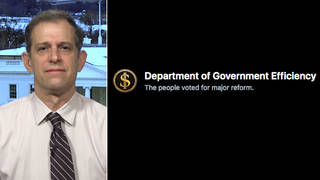
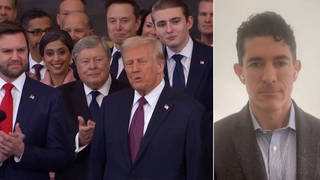
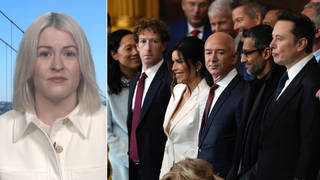





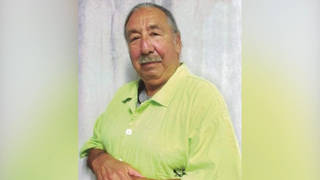
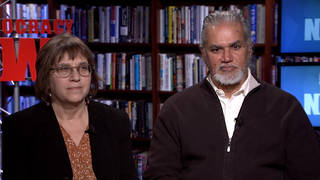
Media Options